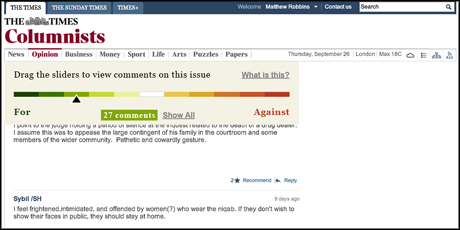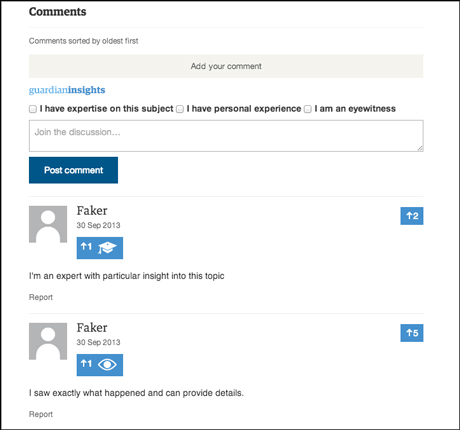
A team from The Times won a two-day journalism hackathon, ending on Friday, in which six teams from UK newsrooms were given the task of "re-imagining commenting".
The winning idea was a "thermometer" which "takes the temperature of comments" on The Times website using sentiment analysis.
The Guardian team received a special mention after coming up with the concept of badges for commenters to denote comments left by a "subject expert", an "eye witness" or someone with "personal experience". This idea, called Guardian Insights, would provide the news outlet with "a database of expert commenters".
Teams from The Daily Post in North Wales (Trinity Mirror), the BBC, Haymarket Business Group, and Metro also competed.
The two-day hackathon, which was held at the Guardian, was organised by the Global Editors Network and supported by Google.
The winning team – Henrique Alves, Matt Robbins and Ben Whitelaw from The Times – will compete in the international final being held in Barcelona in 2014.
Here is a summary of the six ideas for improved commenting:
The Times: 'The Times Thermometer'
The Times Team came up with "The Times Thermometer", which rates comments using sentiment analysis.
Most comments on The Times are currently posted on the site early in the day which means "there is an opportunity to filter comments", Ben Whitelaw, communities editor at The Times and Sunday Times, said when presenting the project.
This is currently done by "time" and by the "most recommended" comments, he explained, adding that it is "quite crude" and explaining how the thermometer would better gauge reaction and make it easier for readers to find interesting comments.
Henrique Alves, a news developer at The Times, explained that the thermometer assess the sentiment of each comment by comparing the language in the comments with a dictionary of positive and negative terms.
The thermometer, which would initially be introduced on opinion articles from The Times, would then organise comments on a sliding scale from positive to negative.

Image provided by Ben Whitelaw
Having worked on the concept for two days, Matt Robbins, designer at The Times, said the thermometer "could be plugged into our website tomorrow".
The Times project was selected as the winner for the "simplicity, originality and the ease at which the idea could be implemented", Antoine Laurent, deputy director of the Global Editors Network, said.
The Guardian: 'Guardian Insights'
The Guardian team, which received a special mention, came up with a project called Guardian Insights.
Matt Andrews and Phil Wills pointed out that Guardian comments already have a badge system which sees the news outlet's journalists given a stamp so that readers can identify comments left by members of staff.
Andrews, a web developer at The Guardian, said that experts, those with experience on a topic and eyewitnesses make "a good community" of commenters.
The idea the team came up with is to create a badge for three types of commenters. Users would select a category of "subject expert", "eyewitness" or "personal experience", which is generic enough to be inclusive of all, Andrews explained.
Commenters would also be able to tag other users, flagging someone else as an "expert", for example.

Commenters are given badges. Image provided by Matt Andrews
Guardian Insights would also provide journalists with "a database of experts on particular subjects", Andrews said.
Joanna Geary, the Guardian's social media and communities editor, added there could be commercial benefits. "With some transparent permissions, our #editorslab could have some very interesting commercial implications re. targeting," she said on Twitter.
The Daily Post (Trinity Mirror): 'Community Hub'
A team from local news outlet the North Wales Daily Post came up with the idea of bringing comments left on other platforms, including Twitter, Facebook and Flickr, onto their own site.
Helen Harper, Claire Miller and Rob Grant proposed a solution they called the Community Hub.
A button on the Daily Post's site would lead readers to a place where comments from the other platforms were embedded.
The Daily Post currently requires readers to leave a comment by logging in with either Facebook or Twitter, something Trinity Mirror sites introduced last year.
Grant demonstrated how the Daily Post site gets strong involvement within the various communities, such as Facebook, but the team wanted to increase comments left on the news website.
The team also came up with a rewards scheme, similar to a Nectar Card, to reward commenters. Points collected could be redeemed at businesses in North Wales.
BBC: 'Inline comments'
The BBC team wanted to increase engagement and provide more focussed discussion. They came up with an 'inline' commenting system.
Inline comments, where readers can comment on an individual paragraph of a story, are used by blogging platform Medium and were recently introduced by business news site Quartz.
The BBC News site currently uses "old-school linear commenting", Susie Healey, acting editor at BBC Future Media, explained.
Readers would be able to "turn on or turn off" the box displaying inline comments. The top comment would be anchored with responses below and messages from BBC journalists would be designed to stand out.
Healey said the benefits would be more focussed comments on specific story elements, and the new system would improve the quality of comments.
By embedding comments within the article and breaking away from linear commenting there would be increased engagement, Healey added.
The proposed new comments system would also increase accountability as the audience would potentially challenge journalists.
Haymarket Business Group: 'Inline comments'
The team from the Haymarket Business Group, which publishes titles including PR Week, also came up with the idea of inline comments.
The team pointed out that just because a reader has logged in with Facebook or Twitter, they do not necessarily want to post their comment to Facebook or Twitter. Their proposal therefore did not require comments to also post to that particular social network.
They also came up with a tagging system, allowing commenters to add tags that let readers search for relevant comments on a topic.
Metro: 'Branded comments'
The team from Metro came up with an idea to monetise commenting.
Their solution of "branded comments" would offer a "new revenue stream" and "increased engagement", said the team, consisting of James Cadman, head of tablet editions; Gareth Noon, senior UI developer, and Hoque Ali, a java developer.
It would be easy to implement, the team, consisting of James Cadman, head of tablet editions; Gareth Noon, senior UI developer, and Hoque Ali, a java developer, said.
New brand accounts would be created, and designed in such a way that readers could easily identify that they were comments from brands but not conventional adverts, much in the same was as readers can easily spot native advertising on BuzzFeed or within a Facebook news feed.
Branded comments would enrich the conversation by including "quality comments from brands". As well as being easy to implement, the team explained that branded comments would be "genuinely innovative" as brands do not currently have an easy mechanism for "being part of the conversation".
Disclaimer: Sarah Marshall was one of the judges in the hackday competition.
Free daily newsletter
If you like our news and feature articles, you can sign up to receive our free daily (Mon-Fri) email newsletter (mobile friendly).
Related articles
- 40 essential newsletters every journalist should read
- Five key takeaways from the UK select committee on the future of news
- How Reuters, Newsquest and BBC experiment with generative AI
- Standing out in a crowded market: what makes a top news podcast?
- Guardian launches a new section for readers in Europe









